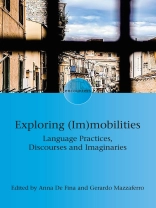The impact of mobility and superdiversity in recent sociolinguistic research is well-established, yet very few studies deal with issues related to immobility. The chapters in this book focus on the sociolinguistic investigation of the dynamics between mobility and immobility as experienced by migrants, asylum seekers and members of minority or exploited groups. Central to the book is an exploration of how mobilities are affected by and in turn affect power relations and of the kinds of resources used by people to deal with (im)mobility processes. The book brings to light a new critical sociolinguistic imagination that is responsive to 21st century processes of (im)mobilities as socially, discursively and emotionally constructed and negotiated.
Содержание
Contributors
Acknowledgements
Anna De Fina and Gerardo Mazzaferro: Introduction
Part 1: The (Im)mobilization of Language Resources, Repertoires and Practices
Chapter 1. Mari D’Agostino: Multilingual Young African Migrants: Between Mobility and Immobility
Chapter 2. Necia Stanford Billinghurst: Sociolinguistic (Im)mobilities in Spaces of Migration
Chapter 3. Katrijn Maryns and Stef Slembrouck: Categorization and the Use of English as an (Im)mobile Resource in Service Encounters with Migrants in Flanders
Part 2: (Im)mobilities, Technologies and Control
Chapter 4. Maria Sabaté-Dalmau: Controlling Migrants’ (Im)mobilities through Telecommunications: Technopolitical Governance in Telephony Advertising Discourse
Chapter 5. Massimiliano Spotti: On Being Enregistered into the Matrix of Online Knowledge: An Ethnographic Exploration of an Internet-based Dismissal in an Asylum-seeking Procedure
Chapter 6. Marco Jacquemet: From Language to Politics: Communication, Power, and Migration in the Central Mediterranean
Part 3: Spaces of (Im)mobility and Resistance
Chapter 7. Anna De Fina and Gerardo Mazzaferro: Everyday Communicative Practices and Repertoires in Contexts of Involuntary and Enforced Immobility
Chapter 8. Ana Deumert: Beachspaces: Racism and Settler-Colonial (Im)mobilities at the Shoreline
Chapter 9. Birgul Yilmaz: Language and Humanitarian Governmentality in a Refugee Camp on Lesvos Island
Part 4: (Im)mobilities, Subjectivity, Identity and Agency
Chapter 10. Mike Baynham, Bahiru Shewaye and Gomes O. Kayode: Estrangement and Home in Queer Asylum Stories
Chapter 11. Roberta Piazza: The Power of (Im)mobility: Irish Travellers’ Agentive Identities in Transit and Permanency
Chapter 12. Jan Blommaert: Postscript: Immobilities Normalized
Index
Об авторе
Gerardo Mazzaferro is Senior Lecturer in Linguistics at the University of Turin, Italy. He is the author of Translanguaging as Everyday Practice (2018, Springer).












